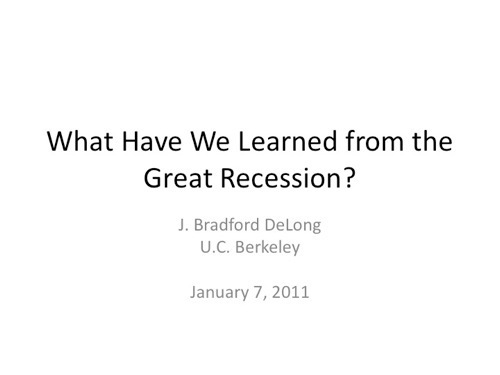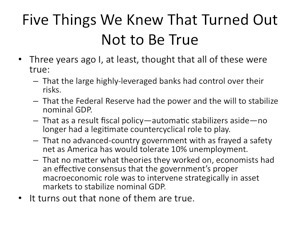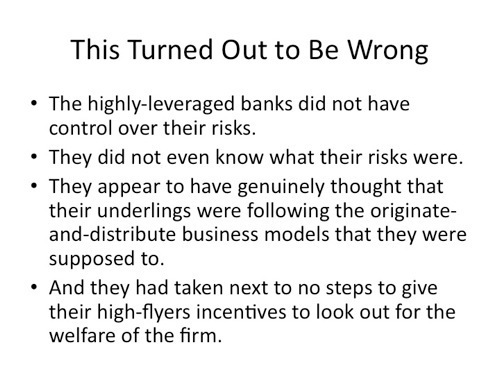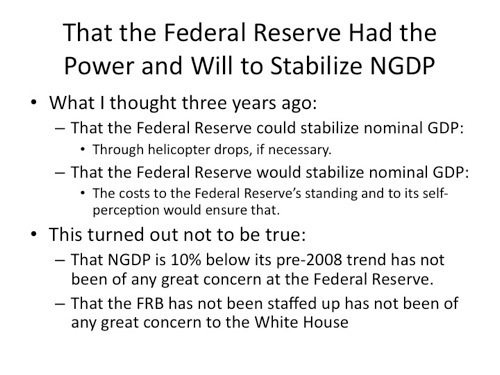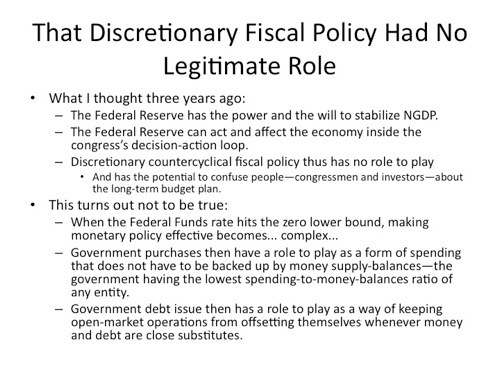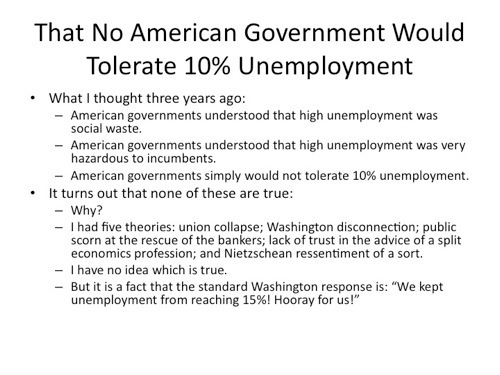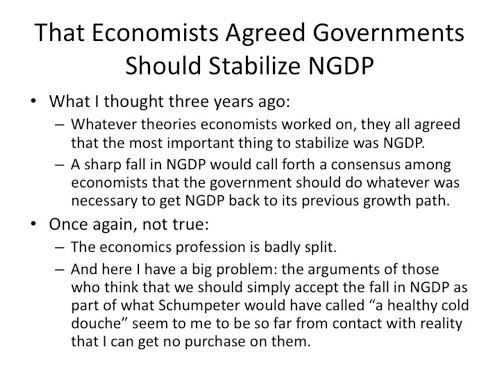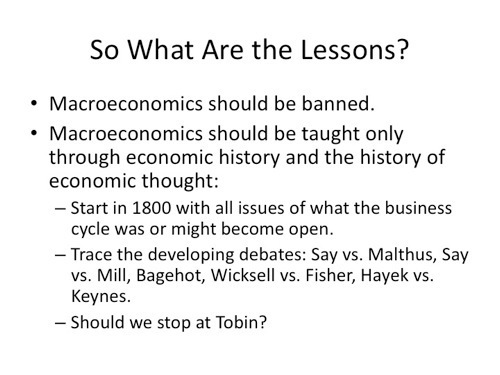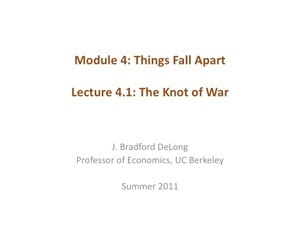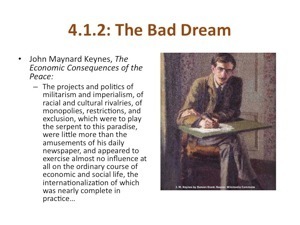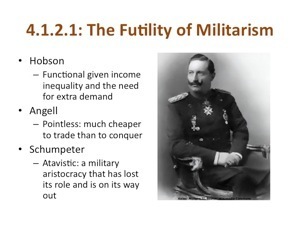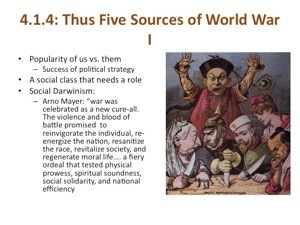J. Bradford DeLong's Blog, page 2125
January 9, 2011
This Would Be Funny If It Were Not So Sad...
Jonathan Martin and Ben Smith and Alexander Burns:
Violence and politics merge in Arizona: [Some Republicans] acknowledged what they called an unavoidable reality—flamboyant or incendiary anti-government rhetoric of the sort used by many conservative politicians, commentators and tea party activists for the time being will carry a stigma. A senior Republican senator, speaking anonymously in order to freely discuss the tragedy, told POLITICO that the Giffords shooting should be taken as a “cautionary tale” by Republicans.
“There is a need for some reflection here - what is too far now?” said the senator. “What was too far when Oklahoma City happened is accepted now. There’s been a desensitizing. These town halls and cable TV and talk radio, everybody’s trying to outdo each other.”
The vast majority of tea party activists, this senator said, ought not be impugned.
“They’re talking about things most mainstream Americans are talking about, like spending and debt,” the Republican said, before adding that politicians of all stripes need to emphasize in the coming days that “tone matters.”
“And the Republican Party in particular needs to reinforce that,” the senator said...
How is the Republican Party going to "reinforce that" if its senators all cowardly hide behind the screen of anonymity--do not believe that they can freely discuss the tragedy with their names attached?



January 6, 2011
Recommended Reading
The Seventeen-Year-Old says that this article is very good:
Andrei Shleifer and Daniel Treisman (2011), "Why Moscow Says No," Foreign Affairs:
Too often over the last decades, policymakers in Washington have viewed Moscow's resistance to U.S. policies through the lens of psychology. In fact, Russia's foreign policy has been driven by its own rational self-interest...



January 5, 2011
What Have We Learned from the Great Recession?
Betting on an Energy Cornucopia?
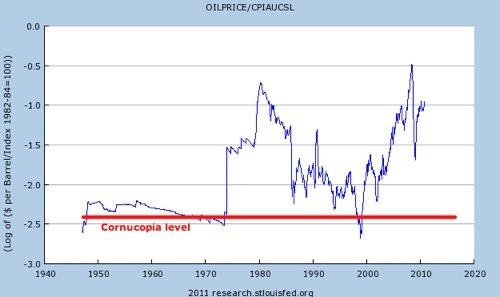
The utterly remarkable John Tierney wrote:
Economic Optimism? Yes, I’ll Take That Bet: [T]he overall energy situation today looks a lot like a Cornucopian feast.... Giant new oil fields have been discovered off the coasts of Africa and Brazil. The new oil sands projects in Canada now supply more oil to the United States than Saudi Arabia does. Oil production in the United States increased last year, and the Department of Energy projects further increases over the next two decades...
The professionals, of course, do not think that the overall energy situation looks like a "cornucopian feast." If they did, then they would be selling their oil in the ground right now at an "energy cornucopia" price. What is an "energy cornucopia" price be? Well we had an energy cornucopia in the first post-World War II generation--and, adjusted for inflation, the price then corresponds right now to a price of $20/barrel. If the professionals saw an energy cornucopia coming, they would be pumping more oil out of the ground right now and selling it for a lot less than $80/barrel in order to make money before the price of oil falls to its cornucopia price.
Instead, the professionals think that keeping oil in the ground rather than selling it at $80/barrel is a reasonable bet.
I don't think I know better than the professionals on this one. But I now have a bunch of vitriolic emails from people saying that they think Tierney is right--that the overall energy situation today does look a lot like a Cornucopian feast, like the one we had in the first post-WWII generation.
Maybe I should see if I can find any takers on the internet who would pay me for a put option for oil at $20/barrel?
(Let me say that I would be very surprised if the spot price of West Texas Intermediate crude oil were to ever again average $20/barrel for any substantial period of time in my lifetime or my children's lifetime. China is HUNGRY. And I don't see new mega-cheap extraction technologies on the horizon--and neither do the professionals. Others who disagree should be shorting oil massively right now.)



Fear the Robot Uprising! Nick Rowe Makes Two Errors in His Analysis of "Robots That Are Just Like Humans"

Nick Rowe writes:
Worthwhile Canadian Initiative: Robots, slaves, horses, and Malthus: I think this is the model that Karl Smith has in mind:
Assume robots are the same as humans. Robots can do all the work that humans can do. Robots need the same amount of energy/food to stay functioning as humans do, but robots themselves can produce that energy/food just like humans can. Robots will need maintenance and training as humans do, but robots themselves can produce that maintenance and training just like humans can. Robots can produce other robots, just as humans can produce other humans. The only difference between robots and humans is that robots are owned by humans. Robots are just like human slaves. Robots will earn the same wages as humans, but those wages, minus the costs of the robots' subsistence, will go to the robots' owners. Just like slaves. Robots' owners will program their robots to build more robots, as long as the surplus of wages over subsistence is positive. Just like slave-owners will want their slaves to reproduce. And just like human workers reproduce in a Malthusian model. Given diminishing marginal product of human plus robot labour, the total population of humans plus robots will expand until the Malthusian limit is reached.
At that Malthusian limit, wages are driven down to subsistence. But unlike Malthus, who allowed that subsistence wages might be determined in part by custom and culture, the level of subsistence wages for robots would be a strict biological constant. It's the bare minimum that robots need to survive and reproduce. At that strict Malthusian steady state, robots, like slaves, are no longer scarce. There's no point in owning either if the marginal product of their labour equals the cost of their subsistence.
In the Malthus/Ricardo model, land was the only scarce factor of production in the steady state. Land rents increased as population expanded and wages were driven down to subsistence. Land rents were the only surplus....
Horses were once like robots. Horses could do a lot of the same work that humans could do. Humans and horses can pull things, if you feed them. But then mechanical horses, called tractors, were invented, that could pull heavier things with cheaper food. Tractors pushed horses' wages below subsistence, so the horse population declined. The robot horse displaced horses, just as horses displaced humans from all the jobs where humans pulled things. But humans, unlike horses, can do lots of other jobs beside pulling things. Humans are very versatile. Horses can't really do anything except pull things. So humans switched to doing other jobs, while horses couldn't. And the marginal product of labour, and hence wages in those other jobs, increased. Horses and tractors were complementary factors to human labour in those other jobs.
But that won't happen if robots are invented that really are just like humans, and can do all the jobs that humans can do. Robots that are just like humans would be just like slaves, rather than like tractors and horses.
I own land.
First of all, robots can make land--either by dredging the sea bottom and piling up mud, or by going into outer space and building habitats and terraforming planets. Land is not safe.
Second, robots that are just like humans will be no happier receiving a Malthusian subsistence wage while Nick Rowe lolls about in luxury than human slaves would be. Think "robot uprising."



The Attraction of Communism in the 1930s
George Orwell:
Practically everything we do, from eating an ice to crossing the Atlantic, and from baking a loaf to writing a novel, involves the use of coal.... Here am I, sitting writing in front of my comfortable coal fire.... It is only very rarely... that I connect his coal with that far-off labour in the mines.... Yet their lamp-lit world down there is as necessary to the daylight world above as the root is to the flower.... [I]t is brought home to you, at least while you are watching, that it is only because miners sweat their guts out that superior persons can remain superior. You and I and the editor of the Times Lit. Supp., and the Nancy Poets and the Archbishop of Canterbury and Comrade X, author of Marxism for Infants—all of us really owe the comparative decency of our lives to poor drudges underground, blackened to the eyes, with their throats full of coal dust, driving their shovels forward with arms and belly muscles of steel...
Victor Gollancz:
[T]he most frequent argument which socialists have to face is precisely this: ‘I agree with you that Socialism would be wholly admirable if it would work-but it wouldn’t’.... [This] objection was more frequently heard in 1919 than in 1927, in 1927 than at the end of the first Five Year Plan, and at the end of the first Five Year Plan than to-day-the reason being precisely that... the achievements of the Soviet Union are there to see...
George Orwell again:
In outward appearance [Barcelona] was a town in which the wealthy classes had practically ceased to exist.... [E]veryone wore rough working class clothes.... All this was queer and moving. There was much in it that I did not understand, in some ways I did not even like it, but I recognized it immediately as a state of affairs worth fighting for.... There was no unemployment...you saw very few conspicuously destitute people, and no beggars.... Above all, there was a belief in the revolution and the future, a feeling of having suddenly emerged into an era of equality and freedom. Human beings were trying to behave as human beings and not as cogs in the capitalist machines. In the barbers’ shops were anarchist notices...solemnly explaining that barbers were no longer slaves...



Powerpoint Slides for My World War I "The Knot of War" Lecture
This Means War!!
McGraw-Hill and Google Books just charged my $14 for what seemed to be an electronic copy of Hyman Minsky's Stabilizing an Unstable Economy but was actually only the first chapter of the book.
I don't like being charged $14 for introductory book chapters. I don't like bait-and-switch.
I think Google Books has some considerable amount of explaining to do...



Yes. Republicans Lie All the Time. About Everything
Ezra Klein:
Ezra Klein - Repealing health-care reform would cost hundreds of billions of dollars -- and Eric Cantor knows it:
House Republicans are in a pickle.... [T]he health-care bill reduces the federal deficit by more than $100 billion over the next 10 years. Luckily, they've figured out an answer to their problem: They've decided to simply exempt the repeal bill from the rules. That means they're beginning the 112th Congress by lifting their own rules in order to take a vote that will increase the deficit. Change we can believe in, and all that.
Republicans are aware that this looks, well, horrible. So they're trying to explain why their decision to lift the rule requiring fiscal responsibility is actually fiscally responsible. Majority Leader Eric Cantor got asked about this, and he returned the reporter's serve with a volley of nonsense:
About the budget implications, I think most people understand that the CBO did the job it was asked to do by the then-Democrat majority, and it was really comparing apples to oranges.... It talked about 10 years' worth of tax hikes and six years' worth of benefits. Everyone knows beyond the 10-year window, this bill has the potential to bankrupt this federal government as well as the states.
That's all well and good -- but it's not true....
As for the period "beyond the 10-year window," the Congressional Budget Office -- which is now comparing "apples to apples," as the law is delivering full benefits for all 10 of the next 10 years -- says the law saves vastly more money in its second decade:
The legislation will reduce federal deficits during the decade beyond the 10-year budget window relative to those projected under current law—with a total effect in a broad range around one-half percent of GDP.
That's in the neighborhood of a trillion dollars.
What's important about Cantor's argument is not that he's wrong. It's why he's saying something he knows to be wrong. There are plenty of reasons to oppose the health-care reform bill. You might not want to spend that money insuring people, or you might not think the legislation goes far enough in reforming the system. But as a matter of arithmetic, using the math that Congress always uses, the bill saves money.... But Cantor and the GOP know full well that the bill is unpopular largely because people think it increases the deficit. Polls have shown that only 15 percent of Americans know that CBO said it will reduce the deficit. If, in the repeal fight, it becomes widely understood that the bill reduces the deficit, it will become more popular. So it's crucial, as the repeal effort goes forward, for Republicans to become much more brazen in falsely asserting that the bill doesn't really reduce the deficit, and that even if the CBO does say it reduces the deficit, that they're saying that because they've been tricked somehow. But CBO wasn't tricked. If it were, Cantor, who has a staff dedicated to figuring these things out, would have a better argument than the one he's offering.
There's no excuse for anybody to ever carry water for this Republican Party. Anybody. Ever.



in a Good World, the Washington Post Would Have Closed Long Ago
Why oh why can't we have a better press corps? Over to Paul Krugman:
Fiscal Shock: I see that the Washington Post editorial board is shocked, shocked to discover that the incoming Republicans aren’t serious about deficit reduction. Who could have suspected?
I was going to be snarky all the way here, but actually let’s be serious: the gullibility of much of the media establishment on all this amounts to journalistic malpractice. Republicans have, after all, been the party of fiscal irresponsibility since 1980; the GW Bush administration confirmed, if anyone was in doubt, that unfunded tax cuts are now in the party’s DNA. Then along comes a Democratic president who presides over all of two years of deficits in the immediate aftermath of a severe financial crisis – which is a time when you’re actually supposed to run deficits. Republicans begin inveighing against the evils of red ink – and, incredibly, get taken at face value. And even if you didn’t know the history, if you actually paid attention to what leading Republicans were saying, their lack of seriousness was totally obvious. You had the Ryan plan, which claimed to reduce the deficit but, if you actually looked into it at all, relied completely on magic asterisks; you had the declarations by top Republicans that deficits are terrible but there’s no need to offset the cost of tax cuts.
The idea that these people were allowed to pose as deficit hawks is stunning.
Oh, and for those claiming that Republicans have always said that spending, not deficits is what matters... this is very much revisionist history; you can’t denounce the federal debt, then claim that you never cared about the revenue side of things. Beyond that, the deficit scare tactics lately have been all about solvency, not mere crowding out... [for] solvency... the deficit, not spending, is what matters...



J. Bradford DeLong's Blog
- J. Bradford DeLong's profile
- 90 followers


